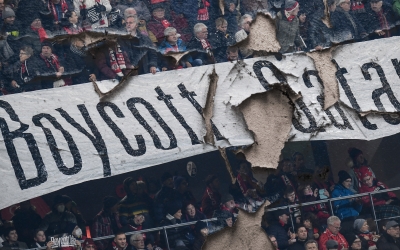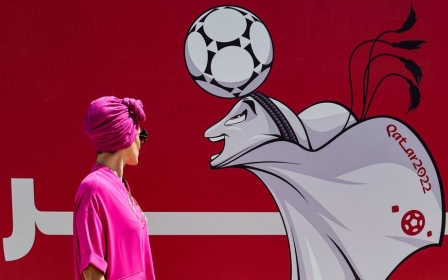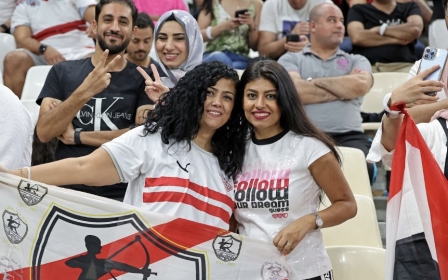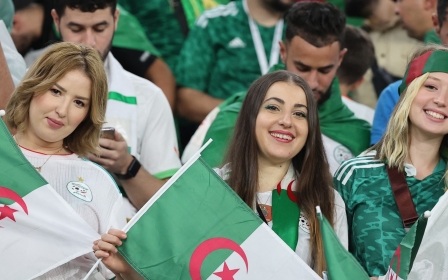Qatar World Cup: Western hypocrisy knows no bounds

The 2022 World Cup in Qatar has been the focus of unprecedented debate since the Arab state won its hosting bid in 2010. While many international sporting events have fuelled moral discussions over the human rights records of the host countries - such as the controversy over China’s suppression of Uyghurs in Xinjiang ahead of the Olympics in Beijing this year - none have been as viciously attacked as Qatar.
This debate is brimming with hypocrisy, Orientalism and Eurocentrism. The main criticisms centre on Qatar’s treatment of foreign workers, particularly those employed to build World Cup projects. The country has spent an estimated $220bn on building stadiums, roads and other infrastructure to support the international tournament, and was aiming to prepare 130,000 hotel rooms.
Why must all countries schedule their most significant international sporting events according to Europe's holidays?
Foreign workers in the construction and hospitality sectors in all Gulf states, including Qatar, suffer from poor working conditions, long hours and low wages, but safety measures for large infrastructure projects are relatively good. In addition, Qatar and other Gulf states have reformed the kafala sponsorship system, which previously restricted workers from changing jobs without the permission of their employers. Qatar also recently introduced a minimum wage.
While these changes in labour laws are positive, they don’t go far enough, and western media have rightly condemned the poor working conditions for foreign labourers ahead of the World Cup. But the reporting on this issue has been rife with hypocrisy.
Indeed, many of the biggest construction firms that have worked on World Cup projects, along with many hotels and residences, are western-based. Westerners in these industries also earn higher salaries in Qatar. These facts, however, are rarely addressed by western critics of Qatar’s human rights record.
New MEE newsletter: Jerusalem Dispatch
Sign up to get the latest insights and analysis on Israel-Palestine, alongside Turkey Unpacked and other MEE newsletters
'Desert World Cup'
Western ex-pats are among the biggest beneficiaries of the unfair and unjust wage distribution in Gulf states, including Qatar, but this issue has not gained traction in western coverage. They are often offered attractive compensation packages, including relocation and accommodation expenses, along with tax-free salaries.
Western hypocrisy is also evident, as British journalist Piers Morgan has pointed out, in the behaviour of media corporations. While condemning Qatar’s human rights record and labour conditions for foreign workers in relation to the World Cup, these same companies have sent their staff to enjoy the affordable luxuries made possible by these very workers.
Outrageously disrespectful to Qatar that the BBC didn’t broadcast the World Cup opening ceremony, and instead put out more virtue-signalling guff about how awful it is. If they’re that appalled, they should bring home their vast army of employees & spare us this absurd hypocrisy.
— Piers Morgan (@piersmorgan) November 20, 2022
Criticisms over the Qatar World Cup have tended to feature a mix of white supremacy and Orientalism. Some have dubbed it a “desert World Cup”. In covering the debate over the tournament, the BBC used another tired trope, asserting that it was “blighted by a dust-storm of controversy”. The Daily Star, meanwhile, published an “exclusive” article headlined: “Grunting camels outside England’s Qatar HQ leave team facing sleepless nights”.
Such coverage relies on a stereotypical, Orientalist picture of those who live in the Arab world, conveying an inaccurate impression to western readers. While Qatar might have been a small desert nation before it gained independence from British colonialism in the 1970s, it is now a bustling country with outstanding infrastructure, beaches, buildings and human development. And for the record: I lived in the Gulf for close to a decade, and never once saw a camel.
Global game
Eurocentrism is another factor in the debate over the Qatar World Cup. In the Netflix series FIFA Uncovered, one commentator questioned how European fans would be able to reach Qatar. This a valid question, but why isn’t this asked about Middle Eastern, African and South American fans when the World Cup is hosted in Europe - which it has been close to a dozen times.
Western media coverage also focused on the soaring summer heat in Qatar, which is why the tournament was ultimately scheduled for November and December. According to the Daily Mail, this decision “robbed us of a summer of football”. But why must all countries schedule their most significant international sporting events according to Europe’s holidays? There is no answer, except, Eurocentrism.
A French reporter was asked about his first impression of Qatar, and he replied that it had “lots of mosques”. Such comments reinforce the notion of westerners feeling discomfort outside of the traditional European environment. But why shouldn’t other countries be able to host the World Cup and showcase their own cultures and traditions?
Yes, Europe has a strong football tradition and has won more World Cups than any other continent. But football is a global game and its biggest tournament should showcase various countries, regions and continents.
The 2022 World Cup offers an opportunity to address human rights issues in Qatar and other Arab states. At the same time, it provides a chance to highlight hypocrisy, Orientalism and Eurocentrism in western media coverage. The World Cup should be a celebration and an opportunity to improve the sport in all countries, across all continents.
The views expressed in this article belong to the author and do not necessarily reflect the editorial policy of Middle East Eye.
Middle East Eye delivers independent and unrivalled coverage and analysis of the Middle East, North Africa and beyond. To learn more about republishing this content and the associated fees, please fill out this form. More about MEE can be found here.






